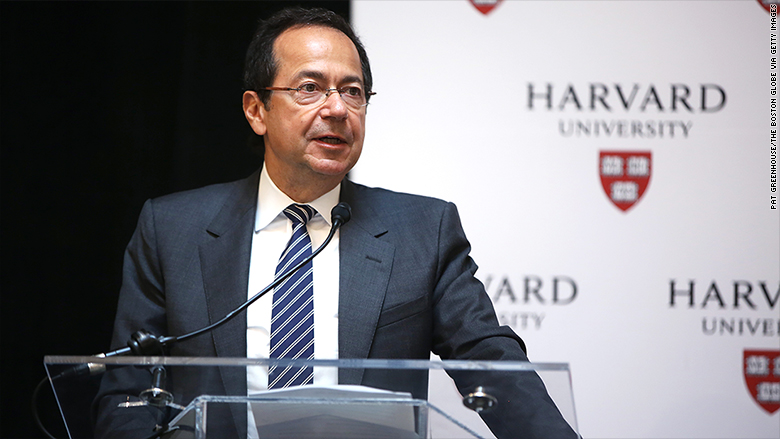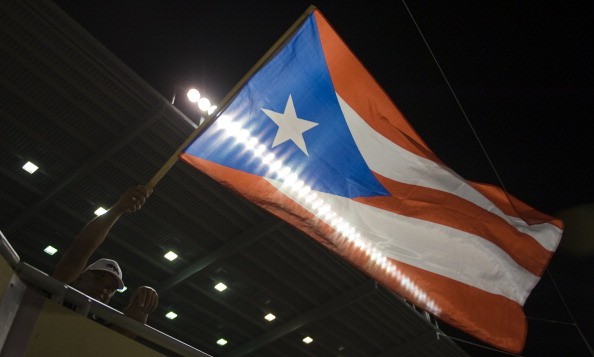Years of economic decline has driven hundreds of thousands of island residents to the US mainland, and is upending the political calculus on the presidential trail.
Puerto Rican residents cannot vote for the president in the general election, but can cast votes in primary contests.
The hotly contested Republican primary now has every candidate scrambling for whatever delegates they can find, leaving Puerto Rico's oft-ignored primary on March 6 a unique opportunity for a pickup.
Even more significantly, a huge chunk of the Puerto Ricans that fled the island resettled in Florida, presenting a new voting bloc in that critical swing state.
“Over half are going to one state, and that’s Florida. This will have an impact on the primaries and subsequent November elections,” said Amilcar Antonio Barreto, an associate professor at Northeastern University and an expert on Puerto Rican politics. “They’re a big wild card.”
Puerto Ricans occupy a unique space in U.S. politics. While on the island, they are residents of a commonwealth and cannot ultimately vote for the president. But they are also American citizens, and free to move to the mainland whenever they want, where they can vote in the general election.
And hundreds of thousands of Puerto Ricans have made that choice, as a massive debt crisis is forcing the island to ask Congress to let it declare bankruptcy on some of its bonds and made providing basic public services a significant challenge.
The mass exodus from Puerto Rico has placed the island in the sights of competing campaigns, eager to win over not only island residents, but former residents now spread across the country.
According to experts, Puerto Ricans generally lean Democratic by a roughly 2 to 1 margin, and Hillary Clinton
 Hillary Rodham ClintonFinal Clinton emails coming todayBlack GOP senator condemns Trump for failing to denounce KKK Trump gets first Senate endorsementMORE is expected to win the Democratic primary on the island in June.
Hillary Rodham ClintonFinal Clinton emails coming todayBlack GOP senator condemns Trump for failing to denounce KKK Trump gets first Senate endorsementMORE is expected to win the Democratic primary on the island in June.But every delegate will count for GOP candidates, with talk of a contested convention growing. And it seems as if the island is up for grabs, with no apparent polling having been done for Republicans.
Prediction markets give Marco Rubio
 Marco RubioRubio attacks Trump’s short fingers What would TrumpCare look like?Black GOP senator condemns Trump for failing to denounce KKKMORE an edge, but Donald Trump
Marco RubioRubio attacks Trump’s short fingers What would TrumpCare look like?Black GOP senator condemns Trump for failing to denounce KKKMORE an edge, but Donald Trump Donald TrumpLouie Gohmert faces his biggest challengeRubio attacks Trump’s short fingers What would TrumpCare look like?MORE’s extensive real estate ventures have given him a significant presence on the tourism-heavy island.
Donald TrumpLouie Gohmert faces his biggest challengeRubio attacks Trump’s short fingers What would TrumpCare look like?MORE’s extensive real estate ventures have given him a significant presence on the tourism-heavy island.“My guess is that the majority of them are going for Trump,” said Charles Venator-Santiago, an associate professor at the University of Connecticut. “He’s a known quantity in Puerto Rico.”
While Puerto Ricans, as U.S. citizens, are not impacted by immigration policies, Barreto wondered if Trump’s heavy hand on that topic could hurt him if they feel like the broader public is becoming hostile to Hispanics as a whole.
In past GOP primaries, Puerto Rican voters have supported the front-runners, handing Mitt Romney and John McCain
 John McCainRubio earns rare primary endorsement from key Va. newspaperPuerto Rican crisis roils 2016 raceDem candidates buck Obama on GitmoMORE easy wins during their respective White House runs.
John McCainRubio earns rare primary endorsement from key Va. newspaperPuerto Rican crisis roils 2016 raceDem candidates buck Obama on GitmoMORE easy wins during their respective White House runs.Presidential candidates looking to curry favor on the island often do so by nodding toward making it the 51st state. In the past, a majority of Puerto Ricans have supported becoming a state, which would subject the island’s residents to federal income taxes, but also provide access to heightened government benefits. But Congress has generally ignored efforts along that front.
Despite inaction from Washington, presidential candidates including Ben Carson and Rubio have voiced support for Puerto Rican statehood. But the ongoing debt crisis on the island has added a new feature to the politics.
Puerto Rico’s efforts to convince Congress to let it go bankrupt on some of its debt have been met with fierce pushback from investment firms holding those bonds. And generally speaking, support for bankruptcy has fallen down party lines, with Republicans opposed and Democrats in favor.
That has held true on the campaign trail as well. Clinton has publicly backed bankruptcy for Puerto Rico. Many Republicans have steered clear of the topic, but Rubio announced his opposition to it in September, before campaigning on the island.
During Thursday’s debate, Rubio was pressed on his Puerto Rico stance. He argued that it made no sense to allow the island to declare bankruptcy, since the underlying economic and fiscal challenges would remain. And he squarely blamed the island’s current government for the state of affairs.
“Bankruptcy doesn’t work unless you change the way you’re operating,” he said in the CNN debate. “The leadership on the island has to show their willingness to get their house in order.”
That, in turn, earned a sharp rebuke from Puerto Rico’s governor, Alejandro Garcia Padilla.
“I can only hope the four million Puerto Ricans currently living on the mainland, including the one million that are Rubio’s constituents, and the 3.5 million on the Island will remember the Senator’s desertion of the Puerto Rican people when they cast their votes in the primaries and the presidential election,” he said in a statement Friday.
For its part, the Obama administration is pushing a balanced approach that would combine heightened federal oversight of the island’s finances with the ability for Puerto Rico to restructure some of its debt if it cannot strike a deal with creditors.
Such a two-pronged approach appears to be gaining some momentum in Congress, as lawmakers hope to craft a legislative package before the end of March.
Island officials warn that it’s possible, if not probable, the island will default on mandatory payments coming due in May and July.
By Peter Schroeder
Puerto Rican crisis roils 2016 race








